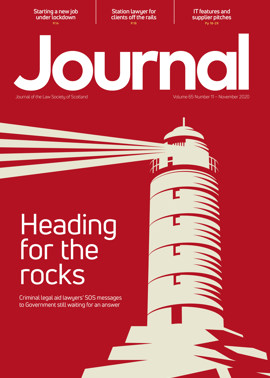Family: Watch your step with behaviour-based divorce
Some recent cases illustrate the evidential and procedural issues involved in dealing with proofs on the merits of divorce, which are worth considering even though most cases may conclude on a non-cohabitation ground.
YI v AAW [2020] CSOH 76 (8 July 2020) was the first Court of Session family proof to take place by videoconference. Both parties resided in Dubai; the defender had raised proceedings there after the pursuer had raised in the Court of Session. The parties agreed that the marriage had irretrievably broken down; however, their behaviour during the marriage and the reason for their separation were disputed.
Lady Wise considered a number of evidential issues. First, since only the parties knew what went on between each other, their evidence required “the most careful scrutiny” (para 32). She did not accept that videoconferencing made assessing credibility and reliability particularly difficult. Her “vision and ability to hear the witnesses was clear and unimpeded” (para 44), and she had been able to observe body language just as she would in the physical courtroom. It is helpful to have such a clear view given the ongoing debate about the role of virtual proofs.
The court also referred to other information in forming a view. Post-separation behaviour was relevant: in evaluating the defender’s evidence the court took into account his actions after separation that were consistent with the pursuer’s position. The pursuer had also provided “one or two adminicles of contemporaneous material that supported her position” (para 33). While merits proofs are unlikely to require extensive vouching, practitioners should consider whether there is any material such as texts or emails that may be lodged.
Finally, Lady Wise confirmed that while evidence must be provided from someone other than the parties to the marriage (Civil Evidence (Scotland) Act 1988, s 8(3)), per Taylor v Taylor 2000 Fam LR 78 corroboration of all material facts is not required. The pursuer’s two corroborating witnesses provided sufficient and consistent support for her account on important matters (para 46).
Affidavit evidence
Proofs on the merits are rare, but even if behaviour is not the focus there can still be pitfalls, as discussed by the Sheriff Appeal Court in Neill v Neill [2020] SAC (Civ) 10 (28 May 2020). In challenging the financial provision ordered by the sheriff, the appellant argued that his approach to the merits had vitiated these orders.
The pursuer and a witness had lodged affidavits dealing with unreasonable behaviour prior to the proof, but neither was cross-examined on this evidence. Having made avizandum, the sheriff took the view that he was “unable to ascertain which party was at fault” and thus unable to grant divorce. The court invited the pursuer’s agent to consider amending to one year’s non-cohabitation with consent. A minute of amendment was intimated but apparently not lodged, following which the pursuer’s agent prepared and lodged (but did not intimate) supplementary affidavits.
The sheriff then granted divorce and made financial orders.
The defender appealed on the basis that the supplementary affidavits, which were “damaging to his general character” (para 14), had been taken into account by the sheriff when making financial orders. The SAC held it apparent that this was so. The lack of opportunity for the defender to challenge this evidence was clearly contrary to natural justice. The pursuer argued that the material in the affidavits was directed only to the (unopposed) merits of divorce, but the court disagreed that the action could be “compartmentalised in that way” (para 25). The action was not formally undefended on the merits and could not now be treated as such.
Agents preparing for a divorce proof must focus and prioritise for reasons of economy and strategy. While parties may informally agree by the time of proof that they both wish to be divorced, Neill suggests it may be risky for defenders not to deal with evidence for the merits on the basis of such agreement. Pursuers also cannot assume that because divorce is not actively opposed, the action can be treated as undefended to the extent of that crave.
The SAC allowed the appeal on the financial orders, but also observed that the sheriff had applied the wrong test to the merits: the question of “fault” was irrelevant. However, it took the view that the original affidavits provided sufficient evidence to grant the crave for divorce.
Decree by default
Finally, the SAC has also provided commentary on the approach to decree by default in divorce actions: A v A [2020] SAC (Civ) 9 (17 July 2020). Because evidence is required before decree can be granted, repelling defences on the basis of default does not automatically lead to divorce. The fact that the sheriff then has to consider the affidavit evidence put forward with the minute for decree provides a safeguard for defenders in default, although in this case the interests of justice did not justify allowing the defender’s appeal.
Regulars
Perspectives
Features
Briefings
- Civil court: keeping justice on the rails
- Employment: Time for a redundancy refresher
- Family: Watch your step with behaviour-based divorce
- Human rights: Inner House message in privacy group chat
- Pensions: The future – the regulator's blueprint
- Scottish Solicitors' Discipline Tribunal
- Crofting law reform: time to act
- In-house, online and in demand
In practice
- Paralegals: 10 years of recognition
- Ask Ash: Too busy, but still insecure
- Property pitfalls: problematic but preventable
- The Word of Gold: Count us out
- Prepare for the tax due date
- The Eternal Optimist: Help to turn the corner
- Appreciation: Ross Paton
- Appreciation: Claire Reilly (Robertson)
- Tenancies succession reminder







